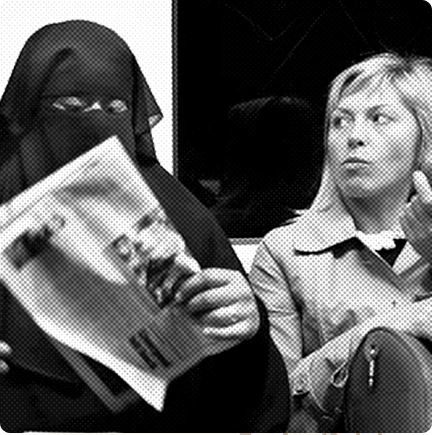

British Muslims
European Muslims
Originated From
Age & Sex
Places of Worship
Ethnic Groups
Defining Identity
What they Say
Profession of Faith
Praying
Social Responsibility
Fasting
Pilgrimage
Muslims in Britain
Impact of Media
Islamophobia
Identity
British & Muslims
Surveys
Interviews
Auto Photography
Impact of Media
Perceptions and Stereotypes
There can be no doubting the influence that the media exerts throughout society today. While the more traditional models of media broadcasting become out-dated and newspaper circulation declines, the evolution of technology and the emergence of the Internet have globalised media, fostering a fast evolving explosion of information being broadcast and delivered from almost anywhere onto computers, phones and hand-held devices.
This is what the BBC’s Director-General, Mark Thompson, has described as ‘Martini media’; consumed ‘anytime, anyplace, anywhere’ [9], which means that today’s media has increasing power not only to reach and reflect, but also to influence what people think. In times of crisis, the media can aggravate or moderate perceptions of fear and threat.
Ever since the 9/11 attacks, newspapers, TV networks and the Internet have been key sites of public debate on Islam and Muslims in Britain. In Britain, genuine feelings of insecurity and fear amongst the general population have become enmeshed with endemic concerns about uncontrolled immigration and criticism of multiculturalism. These discussions are reflected, and often amplified by different media outlets.
How Muslims and Islam are represented in the media reflects societal attitudes towards them, at the same time as shaping the political and cultural space within which Muslims feel excluded or welcome. Indeed, a large majority of those surveyed for this report (Muslim and non-Muslims) hold the view that the portrayal of Muslims in the media affects the public perception of them (please refer to appendices C). [10]
The media represents a vital channel for receiving information, entertainment and cultural satisfaction. We develop our beliefs and values based on the information around us. For some, we are dependent on the media for crucial information and need to be able to trust the sources and content of that information.

“A representative sample of Muslims and non-Muslims, some of whom work in the media industry, were asked whether they thought the mainstream and minority media portrayed Muslims in a balanced manner. The responses gave a clear indication of the widespread perception that the mainstream media do not (72%). This was supplemented by 91% saying that they thought it was the responsibility of the mainstream media to provide a balanced portrayal of Muslims.” [11]
Today, it is not uncommon for young Muslims from Britain to find themselves the subject of news, often on the front pages of newspapers, or leading television news bulletins. As with international news about Muslims, violence, conflict and argument also appear to dominate national news coverage. In the last few years’ alone, national news stories concerning young British Muslims have included: the London bombs of 7 July 2005; controversies involving Muslim girls and school uniforms; a BBC Panorama film questioning the ideological roots of the Muslim Council of Britain; and the Danish cartoons affair.
“Islam perhaps is still considered by many in the media to be ‘different’, in the broadest sense of that word, a foreign faith that sits uncomfortably in Western countries.” [12]
Negative stereotypes of Muslims from such broadcasts, can only build damaging perceptions of Muslims in general, when the media only chooses to broadcast ‘the problems with Muslims’ stories, how can people watching and reading such stories have any other image and perception of Muslims living in Britain? Muslim audiences, on the other hand, believe that the media in Western countries does not portray Muslims with the same sense of completeness, as it would for people of other faiths. As opposed to other faiths, it seems that the identity of ‘Muslim’, is always highlighted when something occurs involving a Muslim person. There is also a perception that media coverage of Muslims focuses disproportionately on bad news and on conflicts, with less time given to contributions made in other areas such as the arts, sciences, culture and cuisine (please refer to appendices C & D). And many Muslims claim that coverage of what are often many-headed disagreements is often reduced to simplistic descriptions of two sides that oppose each other. [12]